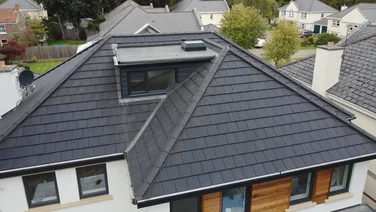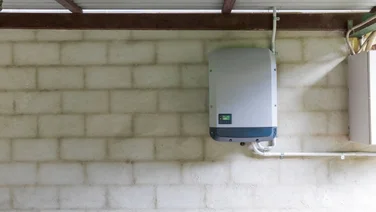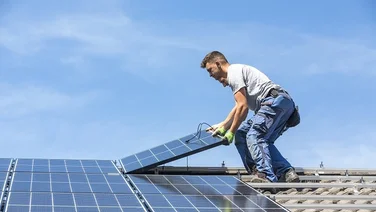We receive a small fee from trusted installers when you request a quote through our site. This helps us keep our content independent, well-researched and up to date – Learn more
- Broken or damaged solar panels affect your system’s power output
- The best solar panel companies usually offer great warranties
- Solar panels are very durable and don’t usually break
- Falling objects, thermal stress, and micro-cracks are leading causes in solar panel damage
Solar panels are great when you want to cut your energy bills and your carbon emissions, which is why more than 1.4 million UK homes now use solar systems (MCS dashboard, 2024).
There’s always a risk that solar panels can break however, despite solar systems being very durable and typically lasting 25 years or more.
If this happens and some or all of your solar panels break, your clean energy generation will be affected.
This guide will cover everything you’ll need to know, from what to do if solar panels break, whether insurance will cover them, the costs to repair panels, and ways you can protect your solar panels from breaking.
Read on to find out.

There’s always a chance one of your solar panels might break. If that happens, there are things you can do.
What do I do if my solar panels are broken?
If your solar panels are broken, the first step you should take is to contact your installer. They’ll typically send an expert to inspect your solar panels to see how they’ve broken, to work out the best course of action, and to let you know how much repair might cost.
They’ll also might tell you what to do to get your solar system working again (not including the broken panel or panels) so you can at least get some power.
Additionally, if the broken panels can’t be repaired, your installer will advise you on where you can take the panel to be properly recycled. You should never try to dispose of a solar panel in a landfill or elsewhere because they contain toxic elements that can cause environmental damage.
Your next step after speaking to your installer will be to get in touch with your insurance provider. Depending on what your solar panel insurance covers, you could get your broken solar panels replaced without having to buy new panels.
Doing these steps as soon as you can is important, because the longer you leave it, the longer you’ll go with a system producing less power than it should be. And that means higher energy bills and more carbon emissions.
How can I tell if my solar panel is damaged?
You’ll be able to tell if your solar panel is damaged pretty quick, because the system’s power output will be lower. Most solar panel systems come with tools to monitor power output, typically in the form of apps for smartphones that update you when there is a change.
Otherwise, you’ll be able to spot damage to your solar panels if it’s physical. Think cracked glass, damage to the frame, or obvious scratches
Internal issues, such as faulty solar cells and disconnected wiring, or imperceptible issues, such as micro-fractures (tiny cracks in the solar cells), can be more difficult to identify.
You’ll still usually be able to tell that something is wrong with the power output though. Either way, if you think your solar panels are broken, call your installer and get them to check.
Will my insurance cover my damaged solar panel?
Solar panel insurance doesn’t usually cover accidental damage, so try to resist climbing on your roof! Things like natural disasters are covered however, so if your panels are damaged in a storm, or a tree falls on them, your insurance is more likely to pay out.
To find out more about what is and isn’t covered by insurance, check out our article on solar panel insurance.
How much will it cost to repair my solar panel?
The cost to repair your solar panels depends on the damage — a few damaged cells could cost as little as £77 for example. Anything more than this and you could be looking to pay as much as £2,150, though this is usually for extreme damage.
On average, expect to pay roughly £460 for solar panel repairs. This is very reasonable when you factor in what a fully functional solar panel system can save you each year on your energy bills — between £270 and £640 for most homes.
You should never try to repair your solar panels yourself, because you risk causing further damage to your panels, your home, and potentially yourself. Instead, always hire a professional.
Be aware that the cost of your repairs will be affected by several factors: the size of your solar system, current market prices, compatibility issues, and the number and individual cost of spare parts, and labour charges.
If you’re looking to replace a broken solar panel, this will will cost you around £702 per panel (including reinstalling it). For a three-bedroom home replacing an entire solar panel system, it’ll typically cost £7,026 for a 3.5 kilowatt peak (kWp) system.
The cost is affected by the type of solar panel, with monocrystalline solar panels being the most expensive, and subsequently the most effective. You’ll spend around 20% more for monocrystalline than polycrystalline, which is less efficient and usually doesn’t last as long.
You can find out more about the costs of solar panels with our helpful guide.
How can I maintain my solar panels to stop them getting damaged?
Maintaining your solar panels is the best way to stop them getting damaged. You can keep your panels in tip-top condition by doing things like getting them regularly serviced. This is a great way to make sure any tiny faults don’t develop into major ones that break your panels.
Also, you should clean your solar panels at least once every two years, to prevent the build up of dust and other debris. With enough time, debris can collect to the point where it puts a strain on your solar panels and could even cause cracks to appear.
Be proactive in removing potential dangers too. If a tree branch is looming over your panels, consider getting it removed.
And finally, keep an eye on the lights on your solar inverter — a flashing green light means all is well and your panels are working properly. If this isn’t the case, it might mean your system has an underlying issue that needs to be looked at.
Not doing so could lead to much bigger issues further down the line.
What do I do with a broken solar panel I can’t repair?
The absolute best thing you can do with an irreparable solar panel is to recycle it (read our guide to solar panel recycling). This is the most environmentally friendly thing you can do, as disposing of solar panels in landfill can lead to toxic materials from the panels leaking into the ground.
Don’t worry about taking the broken solar panels to the UK’s only recycling centre yourself (Recycle Solar, in Scunthorpe) — your installer is legally obliged to do this. The best part is you don’t need to pay your installer to collect your defunct solar panels.
Summary
- Contact your installer if your solar panels break — they’ll inspect them and help you choose the next course of action.
- Solar panel insurance will cover natural disasters and theft, but typically not accidental damage.
- It costs £460 on average for solar panel repairs, though can be £2,150.
- You’ll spend around £702 to replace each broken solar panel, if not covered by insurance.
- Keeping your solar panels well maintained is the best way to avoid damage.








